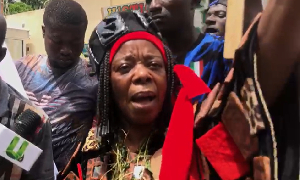By Anthony Kwaku Amoah
Accra, we’re told, has a total land area of about 200 square kilometers with sister areas as Tema, Ashaiman, Weija, Abokobi, Amasaman, Adentan, and even Kasoa in the Central Region. Residents here sometimes also say they are part of Accra.
There are estimated 3.9 million people in Accra with annual growth rate of about 3.36% making it one of the populous cities in Africa. I am also aware that about 56 per cent of its population is under 24 years.
Accra is a boiling point of many cultures. Due to increasing rates of immigration, Accra is always getting more congested. Statistics say the migration of foreign nationals into the city is over 35%.
After school or trade, many people migrate to Accra in search for jobs. Some even terminate their training for quick incomes in the city. Deviant children run away from rural parents and guardians to the streets of Accra, most at times.
It is true rural life sometimes is hard and boring. Farming activities are faced with occasional drought, pest and disease invasions. Farmers lack resources for large scale farming culminating in low yields.
But is the decision to migrate to the already crowded city a better alternative? I do not think so!
Listen to a drop-out secondary school mate who left for Accra and returned shortly with this comment to me at a time I was still in school: “Eei, Tony! Accra is not easy o…You have to struggle to live.”
As a result of joblessness, many youth are compelled to indulge in some nefarious activities, such as pilfering and theft, robbery and prostitution. Others too resort to life-threatening ventures like head portering and cart pushing in order to eke out a living.
Coupled with some accommodation challenges, a chunk of people sleep in kiosks and tents located within markets, lorry parks and on the streets. As many as nine slums, including Sodom and Gomorrah have also been identified in the city.
Poor accommodation also means bad environmental sanitation. Almost every spot of Accra is now dirty and smelly and drains are full of polythene containers filled with garbage.
These areas serve as havens for mosquitoes and other vectors, which are good communicators of many diseases, such as cholera among residents. A tour of areas like the Kwame Nkrumah Circle, Nima, Maamobi, Sukura, Chokor, Agbogbloshie and Mataheko explains the real insanitary situation of our city under review.
Attempts by governments to salvage this situation seem unyielding. The opposition NDC in 2008 promised proper sanitation within a spate of time should they win power. Having spent almost four years in government, it appears the situation is even worse.
Sometimes, one becomes shy to even mention Accra as the capital, notwithstanding some nice facilities like the Sports Stadium, Kotoka International Airport and the National Theatre.
It is difficult to fully appreciate the works of the various sub-Metropolitan units of the Accra Metropolitan Assembly (AMA), including Ablekuma Central, North and South; Ashiedu Keteke, Ayawaso Central, East and West Wuogon; La, Okaikoi North and South; and Osu Klottey in the area of sanitation.
AMA Boss, Alfred Okoe Vanderpuije was very visible in the fight against poor sanitation during his early days of reign. He re-echoed the decision to scatter all slums in the city and convert them into beautiful hubs. The four-year mandate is about to elapse still with the slums around, why?
I do not know how far Dr Vanderpuije and his Assembly have reached with their order for all homes to have well-constructed toilet facilities. Open defecations in drains are still going on.
Madam Sherry Ayitey’s bamboo farm project for use in producing bamboo containers as substitutes for polythene has still not seen the light of day. Polythene packaging with wrongful means of disposal is still the order of the day.
President John Mahama has just launched a sixteen-thousand-member sanitation taskforce to take charge of our nation’s sanitation, especially in the cities. Critics say the move is not only a political gimmick but also a complete waste of time and national resources.
Instead, government should resource relevant institutions and organizations, such as the Environmental Health and Sanitation Unit of the Ministry of Local Government for them to discharge of their duties effectively and efficiently.
Intensive public education is also needed to effect the necessary attitudinal change in citizens about the way the environment is treated.
Bye-laws should be strictly enforced to deter people from polluting the environment with impunity. Ghana must not live in filths and stench forever!!!
E-mail: amoatec27@yahoo.com
Opinions of Wednesday, 3 October 2012
Columnist: Amoah, Anthony Kwaku














